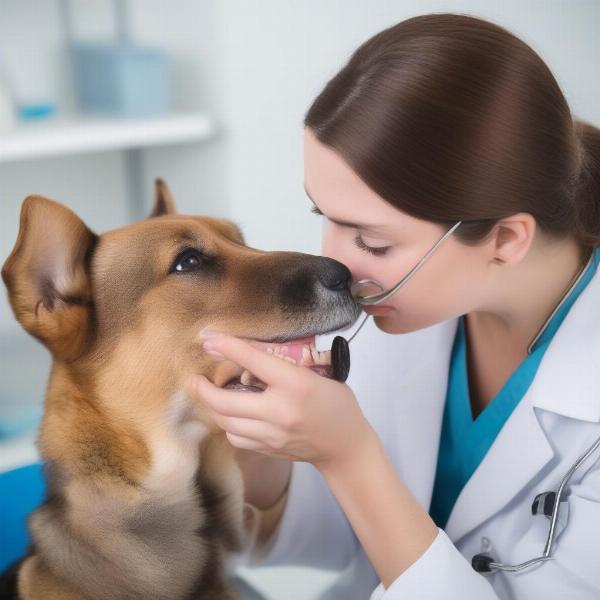Fishy dog breath, also known as halitosis, is a common problem that can range from a mild annoyance to a sign of a more serious underlying health issue. While a slight doggy odor is normal, a persistently fishy smell emanating from your canine companion’s mouth warrants further investigation. This article will delve into the various causes of fishy dog breath, offering practical solutions and advice for concerned dog owners.
Decoding the Fishy Smell: Potential Culprits
Several factors contribute to that unpleasant fishy odor. One of the most common culprits is poor dental hygiene. Just like humans, dogs can develop plaque and tartar buildup, which can harbor bacteria and lead to bad breath.
Another potential cause is kidney disease. When the kidneys aren’t functioning properly, waste products can build up in the bloodstream, sometimes resulting in a fishy or ammonia-like odor on the breath. This is a serious condition requiring immediate veterinary attention. Similarly, liver disease can also manifest as fishy breath, along with other symptoms such as jaundice and vomiting.  Veterinarian Examining a Dog
Veterinarian Examining a Dog
Dietary factors can also play a role. Certain types of fish-based dog food, while healthy, can sometimes lead to temporary fishy breath. alaskan salmon oil for dogs However, if the smell persists even after switching to a different diet, it’s crucial to consult a vet.
Tackling the Issue: Practical Solutions and Prevention
Addressing fishy dog breath starts with identifying the underlying cause. Regular dental care is paramount. Brushing your dog’s teeth daily with a dog-specific toothpaste is the gold standard. Dental chews and toys can also help remove plaque and tartar. why do old dogs smell For more severe cases, professional dental cleaning by a veterinarian may be necessary.
Dr. Emily Carter, DVM, a leading veterinary dentist, emphasizes the importance of proactive dental care: “Regular brushing and dental checkups can prevent a multitude of dental problems and significantly improve your dog’s overall health.”
If the fishy breath is suspected to be related to kidney or liver disease, prompt veterinary intervention is crucial. Diagnostic tests, such as blood work and urinalysis, will help determine the appropriate course of treatment. can dogs eat pilchards in tomato sauce Early diagnosis and treatment are essential for managing these serious health conditions.
Dr. Andrew Miller, DVM, a board-certified veterinary internist, advises: “Never ignore persistent bad breath. It could be a sign of a serious underlying medical condition that requires immediate attention.”
Maintaining Fresh Breath: Long-Term Strategies
Once the underlying cause of fishy dog breath has been addressed, maintaining good oral hygiene is key to preventing recurrence. Provide your dog with plenty of fresh water, as dehydration can exacerbate bad breath. sardine oil for dogs Incorporating dental-friendly treats and toys into their daily routine can also promote healthy teeth and gums.
Conclusion: Fresher Breath, Happier Dog
Fishy dog breath can be a telltale sign of various underlying issues, ranging from simple dental problems to more serious medical conditions. By understanding the potential causes and implementing the appropriate solutions, you can help your furry friend maintain fresh breath and optimal overall health. Don’t hesitate to consult your veterinarian if you have any concerns about your dog’s breath or overall well-being.
FAQ
-
How often should I brush my dog’s teeth? Ideally, daily brushing is recommended.
-
Are there any home remedies for fishy dog breath? While some home remedies might temporarily mask the odor, addressing the underlying cause is crucial. Consult your vet before trying any home remedies.
-
Can certain foods cause fishy dog breath? Yes, some fish-based diets can contribute to temporary fishy breath. However, persistent fishy breath warrants a veterinary checkup.
-
Is fishy dog breath always a sign of a serious problem? Not necessarily. It can often be due to poor dental hygiene. However, it’s always best to consult a vet to rule out any underlying health issues.
-
What should I do if my dog’s breath suddenly becomes fishy? Schedule a veterinary appointment to determine the cause and appropriate course of action.
-
Can dental chews replace brushing? While dental chews can be helpful, they shouldn’t replace regular brushing.
-
How can I prevent my dog from developing fishy breath? Regular dental care, a balanced diet, and routine veterinary checkups are essential for preventing fishy breath.
ILM Dog is a leading online resource for dog owners worldwide, offering expert advice on all aspects of canine care, from breed selection and health to training and nutrition. We provide practical, trustworthy information to help you navigate the joys and challenges of dog ownership. For further assistance or personalized advice, reach out to our expert team. Email: [email protected], Phone: +44 20-3965-8624. ILM Dog is dedicated to providing you with the resources you need to ensure your canine companion lives a long, healthy, and happy life.